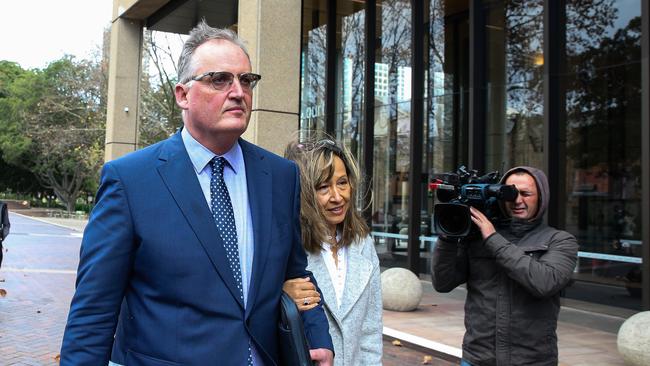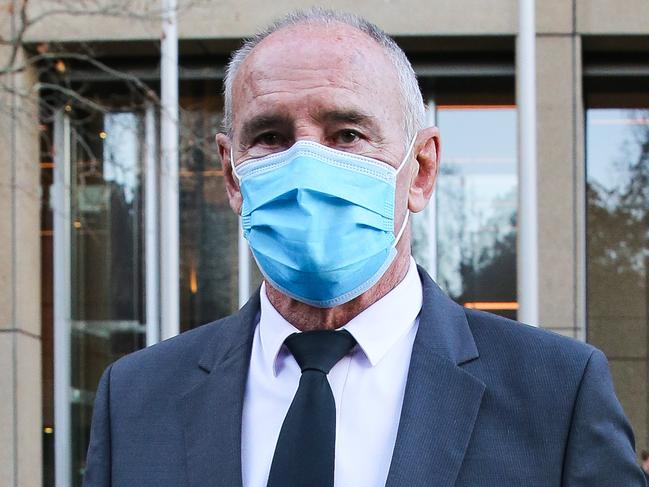Chris Dawson trial: journalist Hedley Thomas grilled over podcast
Hedley Thomas tells NSW Supreme Court he became increasingly convinced Chris Dawson murdered his wife and got away with it.

Journalist Hedley Thomas has told the NSW Supreme Court of becoming increasingly convinced that former teacher Chris Dawson murdered his wife Lynette and got away with it for decades.
Thomas entered the witness box at 11.42am on Monday, as Mr Dawson’s trial for Lyn’s alleged murder approached its final phases, to face a barrage of questions from the defence on whether his views had influenced witnesses and contaminated their evidence.
He said Lyn’s disappearance from Sydney’s northern beaches had been unsolved for 36 years when his hit podcast The Teacher’s Pet was launched in 2018, and ran through a list of witnesses the series unearthed.
Defence counsel Pauline David put it to Thomas that upon embarking on the podcast, he had formed the view that Mr Dawson was guilty of murder.
“No. I thought it was likely but I still had an open mind about it. I wanted to learn more about it. I became more sure as time went on,” Thomas said.
He was asked by Ms David if he thought there had been a failure of the system to prosecute.
“I think there’d been a failure of police to properly investigate and that led to a failure of the system to put him before a court,” he said.
Ms David asked: “You embarked on a campaign to incite prejudice against the accused?”
Thomas answered: “I disagree.”
Ms David took Thomas to comments he made about Mr Dawson on 60 Minutes.
Thomas agreed in court he said on the program: “I think he is a despicable person. I think he’s severely narcissistic. I think he’s dangerous, I think he is lying to himself, his daughters, his friends and family and has been for a long time.”
Ms David asked: “You have never met Christopher Dawson, have you?”
Thomas: “No.”
David: “Why would you say something like that in public?”
Thomas: “I don’t think you need to meet somebody to form a view about them. People could form a view about tyrants, for argument’s sake, without having met them. That at that stage was my view, and it hasn’t changed.”
Thomas said his opinions were based on the findings of two coroners who recommended Dawson be prosecuted, as well as thousands of pages of documents he had read and his own interviews.
In dark suit and tie, Thomas leaned forward to answer many of the questions. Mr Dawson stared directly at him from the other side of courtroom 9D. Crown prosecutor Craig Everson SC began the examination of the journalist in dramatic style, asking Thomas just one substantive question: “Tell the court your full name please?”
Thomas was called as a crown witness as a formality, on the request of the defence.
During cross-examination, the court was played a snippet of The Teacher’s Pet in which Thomas described the criminal connections surrounding the Newtown Jets rugby league club in the 1970s and 80s. Chris and Paul Dawson were stars at the club.
In the snippet, Thomas described the crimes of Arthur “Neddy” Smith, who was the brother-in-law of a team member, convicted drug trafficker Paul Hayward.
Ms David asked Thomas about his inclusion of this in the podcast.
“I had come to the view that it was part of the tapestry of the story. (Lyn Dawson’s sister) Pat Jenkins had told me she wrote to Arthur ‘Neddy’ Smith in prison. It just fit with that narrative that I wanted to convey.“
Ms David: “The narrative you wanted to convey was that Christopher Dawson had an association with notorious criminals.”
Thomas: “It was a narrative I was endeavouring to understand and unpick. I conveyed that the Newtown Jets had that association. Chris Dawson was a member of the Newtown Jets and he played with Paul Hayward. It was impossible to ignore the crime connections to the Newtown Jets in that period. It was part of the evidence in the inquest.”

David: “It was something you wanted to falsely convey to the public that there might be a connection.”
Thomas: “I didn’t falsely convey anything.”
Ms David suggested the podcast had caused him to “become quite famous”.
Thomas: “I don’t think so.”
David: “You won a Walkley Award for your efforts?”
Thomas: “I had won Walkleys before that.”
David: “You won one for this, didn’t you?”
Thomas: “Yes. It was the seventh. It wasn’t a novel or new thing.”
A recorded telephone call between Thomas and Kay Sinclair, an acquaintance of the Dawsons, was played to the court. Ms Sinclair told Thomas that at a friend’s living wake, Mr Dawson told her Lyn joined a commune.
Chris was looking to his twin brother Paul for approval as they spoke, Ms Sinclair said.
In the same phone call, Thomas told Ms Sinclair about feedback from other listeners.
“They have a great sense that there’s been a terrible injustice here and this woman’s been violently murdered and at least one man’s got away with it and that’s wrong, not to mention all the girls they preyed on,” he said.
Ms David said in the call, Thomas also described Mr Dawson as a control freak.
“And you said he’s so tight with money, he wouldn’t have wanted to spend the money, meaning on a hit man,” she said.
“He wouldn’t have wanted someone else having control over the execution of his wife because he could have been extorted or blackmailed as well.
“That’s the sort of theory you discussed with people that you had encouraged to go to the police to give evidence, to give a statement.”
Ms David asked Thomas if he had unduly influenced witnesses including Ms Sinclair by sharing his own opinions.
Thomas: “I think when you have conversations with them and you’re building rapport, it’s a normal thing to discuss and respond to their questions.
“I’m not a police officer, I’m a journalist conducting interviews, asking questions.”
Thomas was asked whether he deliberately sought to undermine public confidence in the justice system with his questions about the role of the Director of Public Prosecutions in declining to previously prosecute Mr Dawson. “My job is not to uphold confidence in these institutions. It’s to question whether something’s gone wrong,” he said.
He will continue giving evidence on Tuesday, ahead of the crown’s final witness, current lead investigator Detective Senior Constable Daniel Poole.


